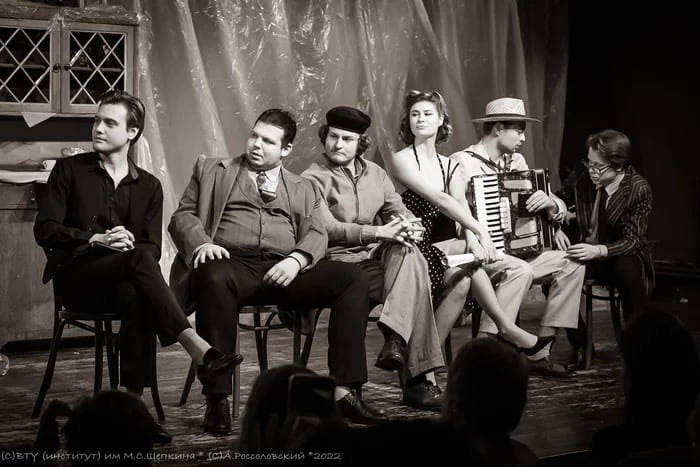Theatre review: Fear Number One, directed by S. Soshnikov (The Mikhail Shchepkin Higher Theatre School)
Author: Irina Lubivaya
I’m still living that show. Some things will pop up. Phrases. Thoughts. I haven’t enjoyed anything like that in a long time. It’s a fine balance between profound and light. Between laughter and human pain. There is air in the play. You breathe it.

By the standards of drama school graduation performances in Moscow, Fear № 1 (Fear Number One) is significant. The last troupe supervised by the People’s Artist of Russia Boris Klyuyev released its premiere in May 2021 — a production based on the play by an Italian playwright Eduardo De Filippo. The events unfold in Naples, where the head of the household (played by the talented young actor Mikhail Ushakov), having lost his mind, won’t leave his family be. The plot follows the classic structure of commedia dell’arte. Matteo’s daughters Evelina (played by Anfisa Khrustaleva) and Maria (played by an Italian born actress Alexandra-Emilia Coveri) dream of getting married. Eventually, for one of them the dream will come true. In the play there are also their suitors, Antonio and Mariano, Matteo’s mother and his wife Virginia, her brother Arturo, random at first glance Signora Vera, who confuses the plot, and Mariano’s mother Luisa (played by an actress of exceptional character Vasilisa Makarova).

Matteo, who survived World War I, doesn’t let his family members live in peace. Hence Arturo decides to save his sister by setting up the announcements of an international chaos. The plan works, Matteo regains peace and proceeds to entrust this fatal idea to the whole world until one day the truth is revealed.

The production was put by a Maly Theatre director Stanislav Soshnikov as a tragicomedy and built around the performance of an actor who seems to make everyone fall in love with his charm and charisma, whatever he does on stage. Mikhail Ushakov brilliantly interacts with the audience addressing them with a motivational speech followed by applause. From time to time, he casually throws in a refreshing sarcastic joke. Despite the heavy subject of the play, the comedic talent prevents the actors from descending into a pit of sadness and apathy. On the contrary, sharp plot twists and frequently improvised subtle jokes make the audience soar above the serious subject propelling people to analyse it, recognise themselves in the characters, laugh at human stupidity and see our shared humanity. And that’s no easy task. Altogether, the play turns out to be thoroughly up to date.

The character played by Vasilisa Makarova is a mother who lost one of her sons. And it’s impossible for her to let go of Mariano, her second child. In fact, in the third act, all the pathos of the comedy is replaced with a very serious motif. The set made of boxes and cellophane transforms into something resembling a mental institution where the characters have a very quiet, as if mute, conversation about what matters most, about parents and children. While watching the production I experienced the dichotomy of feelings: on the one end of the spectrum was pain and anguish, on the other fun and joy. I am especially grateful to the designers who worked on the set, to the director, and to the cast (Vasilisa and Mikhail in particular). I got to meet the cast after the performance. At some point of my conversation with Mikhail I had a feeling that he was Matteo. He’s very lively and genuine on stage. His approach is not acting, but living. It’s not about overacting, but existing inside the character. Fear Number One is Mikhail’s benefit performance, the start of a great journey. He’s very talented. Some people play, but he lives. Just like Vasilisa, a girl around 20 years old, who plays the mother. You simply believe her. It’s wonderful! The performance is full of talent and depth. I’m so happy to have witnessed these guys and their entire troupe perform on the stage of Moscow Imperial Theatre School! What a blessing!
